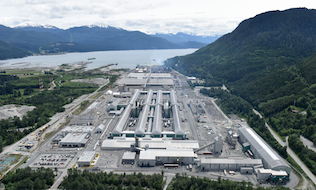

Rio Tinto Alcan Inc. and its unionized employees at the company’s aluminum smelter in Kitimat, B.C. signed a tentative contract on Tuesday night, narrowly averting a strike.
The new four-year agreement covers key issues such as the defined benefit pension plan, health benefits, wages and contract language. The 900 members of Unifor Local 2301 will vote on the agreement on July 27 and 28.
Read: Ford and Unifor ratified agreement includes pension, health benefits changes
According to the tentative agreement published on the Local 2301 website, a number of changes will carry over from the previous collective agreement, including:
- Closing the defined benefit plan to new employees hired as of Jan. 1, 2020.
- Mandatory generic drug substitution will be effective as of Jan. 1, 2018.
- An increase in paramedical benefits coverage, including chiropractic, naturopathic and podiatry, massage and physiotherapy. The first increase is effective immediately with a further increase to come in 2020.
- Vision care will increase to $500 every two years and to $525 in 2020.
Read: Postal workers delay possible job action for 24 hours as contract talks continue
Additions to the agreement include:
- Coverage for a blood pressure monitor to a lifetime maximum of $150.
- Medical travel coverage for dentists and dental surgeons for members who require non-routine dental surgery or procedures.
- A commitment from the employer to provide the equivalent of British Columbia’s current retiree Medical Services Plan subsidy into a health-care savings account should the B.C. government eliminate the program.
“I’m proud of the bargaining committee’s tenacity during this process,” said Jerry Dias, Unifor’s national president, in a news release. “These Unifor members stood up to a global mining giant and got the new collective agreement that they deserve.”
Rio Tinto general manager Gareth Manderson told the Canadian Press the proposed agreement is fair, equitable and will help ensure that employees, the company and the community all benefit from a competitive, sustainable business in northern B.C.
Read: Brampton autoworkers’ strike leads to increased wages but no gains in benefits
